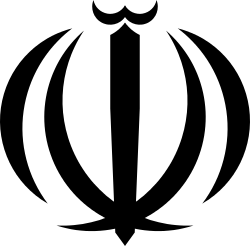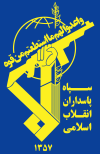Ali Shamkhani
Ali Shamkhani (Persian and Khuzestani Arabic: علی شمخانی, born 29 September 1955) is an Iranian Rear Admiral Upper Half. He is the secretary of the Supreme National Security Council of Iran.
Early life and education
Shamkhani was born on 29 September 1955 in Ahvaz, Khuzestan. His family are of Iranian Arab origin.[4][5] Before the Iranian Revolution, Shamkhani was member of a clandestine Islamist guerilla group named Mansouroun (lit. The Victors), engaging in armed struggle against Pahlavi dynasty. After the revolution, he joined the Mojahedin of the Islamic Revolution Organization.[6] He studied engineering at Shahid Chamran University of Ahvaz.[7]
Career
Shamkhani served as the commander of the IRGC navy with the rank of rear admiral.[8] Later he also commanded the Artesh navy in addition to the IRGC navy.[9] He was appointed as the Minister of Revolutionary Guards in 1988.[10]
Then he held the post of the minister of defense from August 1997 until August 2005 in the government of Mohammad Khatami.[11][12][13] Shamkani was replaced by Mostafa Mohammad-Najjar in the post.[9] Shamkhani also ran for office in the 2001 presidential elections.[5][14]
He was the director of the Iranian Armed Forces' Center for Strategic Studies from 2005 to 2013.[15][16] He is also military advisor to the Supreme Leader, Ayatollah Ali Khamenei.[17][18]
On 10 September 2013, Shamkhani was appointed secretary of the Supreme National Security Council by President Hassan Rouhani.[18]
Shamkhani condemned the US-led coalition airstrikes in Mosul in March 2017 which killed more than 200 civilians and accused the United States of committing war crimes.[19]
Awards and honors
In 2003, Shamkhani received Shoja'at Medal, highest military medal from President Mohammad Khatami.[20] He was also honored for his eight years service as minister of defence in 2005.[20] In 2004, Shamkhani received Order of Abdulaziz Al Saud, highest Medal in Saudi Arabia from King Fahd for his prominent role in the design and implementation in developing relations with Arabic countries in the Persian Gulf.[20][21] He is the first Iranian minister to receive the medal.[20]
See also
References
- ↑ عنوان : اولين مراسم اهدا نشان فتح Navide Shahed
- ↑ farsnews
- ↑ Biography Hamshahri Online
- ↑ Bar, Shmuel (2004). "Iranian Defense Doctrine and Decision Making" (PDF). Institute for Policy and Strategy. Archived from the original (PDF) on 2 April 2012. Retrieved 29 July 2013.
- 1 2 Antony Preston (August 2001). "Yards Compete for Denmark's Command and Support Vessels". Navy League of the United States. Archived from the original on 7 January 2011. Retrieved 27 August 2013.
- ↑ Alfoneh, Ali (2013), Iran Unveiled: How the Revolutionary Guards Is Transforming Iran from Theocracy into Military Dictatorship, AEI Press, p. 10
- ↑ "Ali Shamkhani". Los Angeles Times. Tehran. 15 November 1998. Retrieved 21 August 2013.
- ↑ Zeb, Rizwan (12 February 2003). "The emerging Indo-Iranian strategic alliance and Pakistan". CACI Analyst. Retrieved 21 August 2013.
- 1 2 "Rouhani's Cautious Pick For Defense Minister". 2017-11-07. Archived from the original on 2017-11-07. Retrieved 2018-03-26.
- ↑ Rahnema, Ali (February 20, 2013) [December 15, 2008]. "ii. Jamʿiyat-e Moʾtalefa and the Islamic Revolution". JAMʿIYAT-E MOʾTALEFA-YE ESLĀMI i. Hayʾathā-ye Moʾtalefa-ye Eslāmi 1963-79. Encyclopædia Iranica. Fasc. 5. XIV. New York City: Bibliotheca Persica Press. pp. 483–500. Retrieved March 15, 2016.
- ↑ Bahman Baktiari (1996). Parliamentary Politics in Revolutionary Iran: The Institutionalization of Factional Politics. University Press of Florida. p. 157. ISBN 978-0-8130-1461-6. Retrieved 27 August 2013.
- ↑ Mehran Riazaty (29 June 2005). "Iran's new president". American Thinker. Retrieved 27 August 2013.
- ↑ Rachel Ingber (14 August 1997). "Khatami's Cabinet Choices: On the Record" (Policy Watch 264). Retrieved 28 August 2013.
- ↑ Sahliyeh, Emile (2002). "The reforming elections in Iran, 2000–2001" (PDF). Electoral Studies. 21. doi:10.1016/s0261-3794(01)00041-5. Retrieved 21 August 2013.
- ↑ "Iran to Down Other US Drones If Violations Continue". The Journal of Turkish Weekly. 16 December 2011. Archived from the original on 27 August 2013. Retrieved 27 August 2013.
- ↑ "General Mohammad Salimi". Iran Briefing. 3 February 2011. Retrieved 17 February 2013.
- ↑ Jamil Theyabi (12 August 2008). "The Iranian "Giant"". Al Hayat. Archived from the original on 6 March 2016. Retrieved 27 August 2013.
- 1 2 "Rouhani Appointed Former Defense Minister as the Secretary of NSC". Nasim Online. 10 September 2013. Archived from the original on 14 October 2013. Retrieved 10 September 2013.
- ↑ "Iran urges 'war crime' hearing into US killings in Mosul". Press TV. 26 March 2017.
- 1 2 3 4 علی شمخانی، دبیر شورای عالی امنیت ملی ایران شد Shafaqna
- ↑ علی شمخانی گزینه اصلی تصدی گری وزارت کشور روحانی Archived 9 May 2016 at the Wayback Machine. Barfaaz
External links
![]()
| Military offices | ||
|---|---|---|
| Preceded by Yousef Kolahdouz |
Second-in-Command of the IRGC June 1982 – 24 September 1989 |
Succeeded by Yahya Rahim Safavi |
| Preceded by Mohammad Hossein Malekzadegan |
Commander of the Army's Navy 30 October 1989 – 27 August 1997 |
Succeeded by Abbas Mohtaj |
| Preceded by Hossein Alaei |
Commander of the IRGC Navy 23 December 1990 – 27 August 1997 |
Succeeded by Ali Akbar Ahmadian |
| Political offices | ||
| Preceded by Mohsen Rafighdoost |
Minister of Revolutionary Guards 20 September 1988 – 21 August 1989 |
Ministry dissolved |
| Preceded by Mohammad Forouzandeh |
Minister of Defense 20 August 1997 – 24 August 2005 |
Succeeded by Mostafa Mohammad-Najjar |
| Preceded by Saeed Jalili |
Secretary of the SNSC 10 September 2013 – present |
Incumbent |
.jpg)


